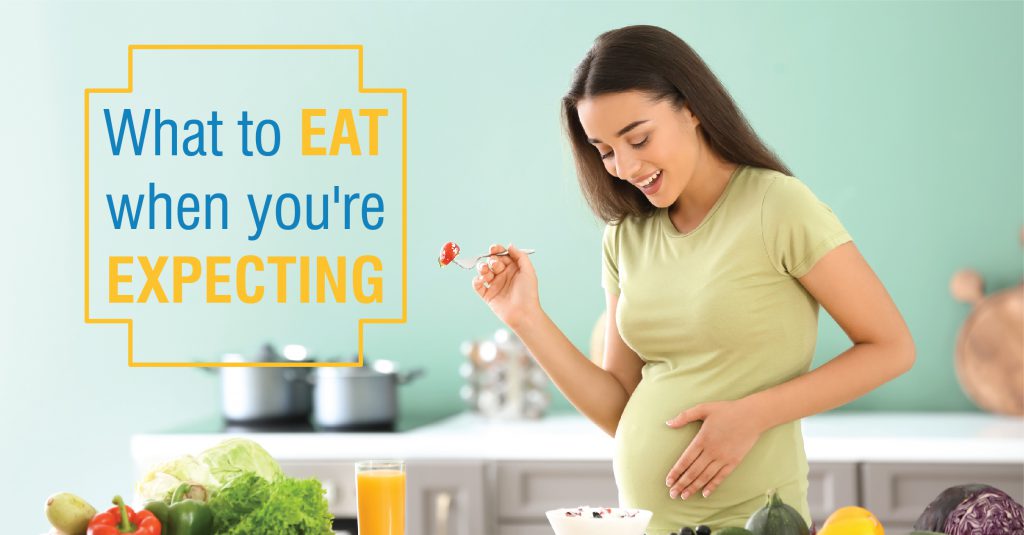
Now that you’re pregnant, you need a lot of essential nutrients for you and your growing baby. It can be confusing for you to keep a track of which ones are the most important and how to incorporate them in your daily diet.
There’s no magic formula for a nutritious pregnancy diet. In fact, during pregnancy, the basic principles of eating healthy remain the same – a balanced diet with whole grains, fruits and vegetables, good amount of proteins and healthy fats and make sure you even drink plenty of water.
However, there are a few nutrients that deserve special attention in your pregnancy diet. Here are a few that top the list:
Folic acid (Vitamin B9)
Folic acid is a pregnancy superhero! Right from the start, during the early development of your little one, and throughout your pregnancy folic acid is beneficial.
Folic acid is crucial in helping to prevent neural tube defects, serious abnormalities of the brain and spinal cord. You may be recommended to take approximately 500 micrograms of folic acid per day.
As your folic acid requirement increases during pregnancy, you may be advised to have folic acid supplementation. Make sure you follow the given recommended dosages.
Where can you get your fill?
You can get ample amounts of folic acid from green leafy vegetables, oil seeds like sesame, oranges, strawberries, legumes like chickpeas, fortified breakfast cereals, beans, etc.
Calcium
It is the most abundant mineral found in your body. Calcium is used to develop your baby’s bones and teeth. Your baby will take all the calcium from your body if you don’t consume enough calcium. This can make you prone to osteoporosis (brittle bones). You may need around 1200 milligrams of calcium per day during your pregnancy.
Where can you get your fill?
Dairy products – Milk, yoghurt, cheese, etc. are the best sources of calcium. Other than these calcium-fortified juices, salmon, tofu, certain legumes and beans, green leafy vegetables, etc. are good sources of calcium.
Iron
Pregnancy can deplete your iron stores. Therefore, it is important to have an appropriate intake of iron to maintain these stores. During your pregnancy, you need an extra amount of iron to make more blood to supply oxygen to your developing baby.
The requirement of iron during pregnancy will be depending on your haemoglobin and iron levels in the blood. Your obstetrician will make sure you are getting enough iron to meet your daily requirements after 16 weeks. Calcium and iron tablets should not be taken together. Maintain at least 3-4 hours of gap between them.
Where can you get your fill?
Some iron-rich foods include meat, poultry, organ meat, iron-fortified salt, iron-fortified cereals, beans, sprouts, etc. To increase the absorption of iron make sure you include vitamin C rich sources like a glass of orange or lime juice with a bowl of iron-fortified cereal, fruits like guavas, berries, melons with your meals.
Also, make sure you avoid the inhibitors like tea/coffee, too much of fibre with the meals- take it an hour before or after the meal. Cooking methods of sprouting, malting, roasting, fermentation, grinding will help in enhancing iron absorption.
Protein
Protein is another important nutrient you need to consume throughout your pregnancy. It helps to build muscle, bone, skin, blood and other parts of your baby’s body. It is especially important in the second half of your pregnancy as your baby begins to grow faster.
Make sure you are getting the recommended daily amount of vitamin. During pregnancy, your protein requirements may be approximately around 70 grams and will vary depending on your body weight.
Where can you get your fill?
Milk, poultry, eggs, fish, yoghurt, cheese, legumes, beans, nuts, etc. are a few sources of protein you can include in your daily diet.
Omega-3 fatty acids
Not all fats are bad especially omega-3 fatty acids. When it comes to your baby, omega-3 helps develop and sustain the health of your growing baby’s heart, immune system, brain and eyes, especially during your third trimester when your baby’s brain growth is at its peak.
Omega-3 fatty acids: Docosahexaenoic acid (DHA) and Eicosapentaenoic acid (EPA) play a vital role in the visual and cognitive development of your growing baby. They may even help fight post-partum depression, regulate pregnancy related mood swings and reduce the risk of preterm birth.
Where can you get your fill?
Salmon, tuna, walnuts, flaxseeds, etc. are rich sources of omega-3 fatty acids.
Iodine
Believe it or not, you and your baby need enough amount of iodine while you’re pregnant. A trace of iodine in your diet plays a big role in brain development. Iodine is essential for the development of the brain and nervous system of your developing baby.
According to the World Health Organization (WHO), iodine deficiency is the world’s most prevalent, yet preventable cause of brain damage. Your daily iodine intake during pregnancy may range between 150-250 micrograms.
Where can you get your fill?
Iodized table salt, seafood, cheddar cheese, etc.
Other than these, there are many other nutrients that you need to consume while you’re pregnant. Your nutritionist will guide you and make a diet plan according to your body needs so that you are provided with all the necessary nutrients.
Your baby is getting all the nutrients from you during pregnancy for his/her growth and development. Therefore, eat healthy and stay active throughout your pregnancy. It is beneficial for you as well as your little one.
“It’s an opportunity to nourish your little one every time you eat”
